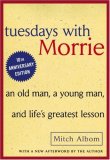Summary | Excerpt | Reading Guide | Reviews | Readalikes | Genres & Themes | Author Bio

An Old Man, A Young Man & The Last Great Lesson
by Mitch Albom
Once, he brought a tango tape and got them to play it over the speakers. Then he commandeered the floor, shooting back and forth like some hot Latin lover. When he finished, everyone applauded. He could have stayed in that moment forever.
But then the dancing stopped.
He developed asthma in his sixties. His breathing became labored. One day he was walking along the Charles River, and a cold burst of wind left him choking for air. He was rushed to the hospital and injected with Adrenalin.
A few years later, he began to have trouble walking. At a birthday party for a friend, he stumbled inexplicably. Another night, he fell down the steps of a theater, startling a small crowd of people.
"Give him air!" someone yelled.
He was in his seventies by this point, so they whispered "old age" and helped him to his feet. But Morrie, who was always more in touch with his insides than the rest of us, knew something else was wrong. This was more than old age. He was weary all the time. He had trouble sleeping. He dreamt he was dying.
He began to see doctors. Lots of them. They tested his blood. They tested his urine. They put a scope up his rear end and looked inside his intestines. Finally, when nothing could be found, one doctor ordered a muscle biopsy, taking a small piece out of Morrie's calf. The lab report came back suggesting a neurological problem, and Morrie was brought in for yet another series of tests. In one of those tests, he sat in a special seat as they zapped him with electrical current--an electric chair, of sorts--and studied his neurological responses.
"We need to check this further," the doctors said, looking over his results.
"Why?" Morrie asked. "What is it?"
"We're not sure. Your times are slow."
His times were slow? What did that mean?
Finally, on a hot, humid day in August 1994, Morrie and his wife, Charlotte, went to the neurologist's office, and he asked them to sit before he broke the news: Morrie had amyotrophic lateral sclerosis (ALS), Lou Gehrig's disease, a brutal, unforgiving illness of the neurological system.
There was no known cure.
"How did I get it?" Morrie asked.
Nobody knew.
"Is it terminal?"
Yes.
"So I'm going to die?"
Yes, you are, the doctor said. I'm very sorry.
He sat with Morrie and Charlotte for nearly two hours, patiently answering their questions. When they left, the doctor gave them some information on ALS, little pamphlets, as if they were opening a bank account. Outside, the sun was shining and people were going about their business. A woman ran to put money in the parking meter. Another carried groceries. Charlotte had a million thoughts running through her mind: How much time do we have left? How will we manage? How will we pay the bills?
My old professor, meanwhile, was stunned by the normalcy of the day around him. Shouldn't the world stop? Don't they know what has happened to me?
But the world did not stop, it took no notice at all, and as Morrie pulled weakly on the car door, he felt as if he were dropping into a hole.
Now what? he thought.
As my old professor searched for answers, the disease took him over, day by day, week by week. He backed the car out of the garage one morning and could barely push the brakes. That was the end of his driving.
He kept tripping, so he purchased a cane. That was the end of his walking free.
He went for his regular swim at the YMCA, but found he could no longer undress himself. So he hired his first home care worker--a theology student named Tony--who helped him in and out of the pool, and in and out of his bathing suit. In the locker room, the other swimmers pretended not to stare. They stared anyhow. That was the end of his privacy.
Excerpted from Tuesdays With Morrie : An Old Man, a Young Man, and the Last Great Lesson by Mitch Albom. Copyright © 1997 by Mitch Albom. Excerpted by permission of Doubleday, a division of the Bantam Doubleday Dell Publishing Group, Inc. All rights reserved. No part of this excerpt may be reproduced or reprinted without permission in writing from the publisher.
Your guide toexceptional books
BookBrowse seeks out and recommends the best in contemporary fiction and nonfiction—books that not only engage and entertain but also deepen our understanding of ourselves and the world around us.